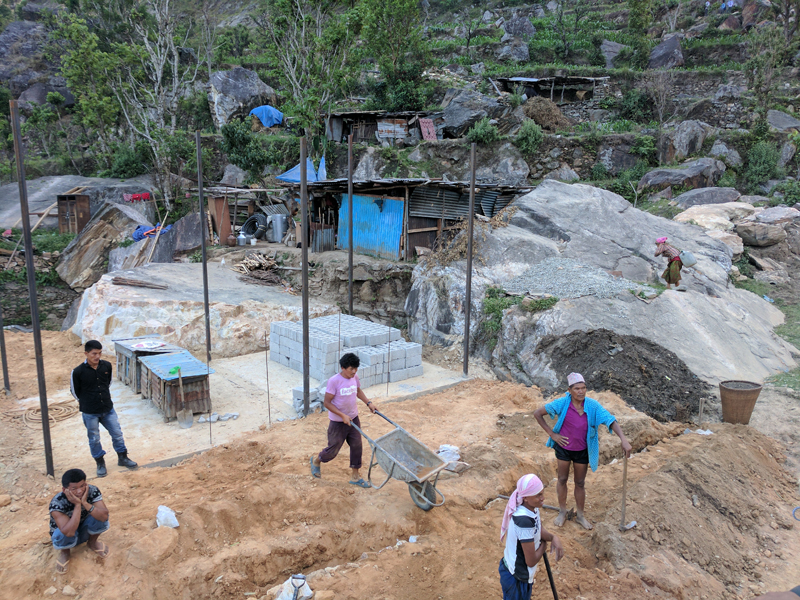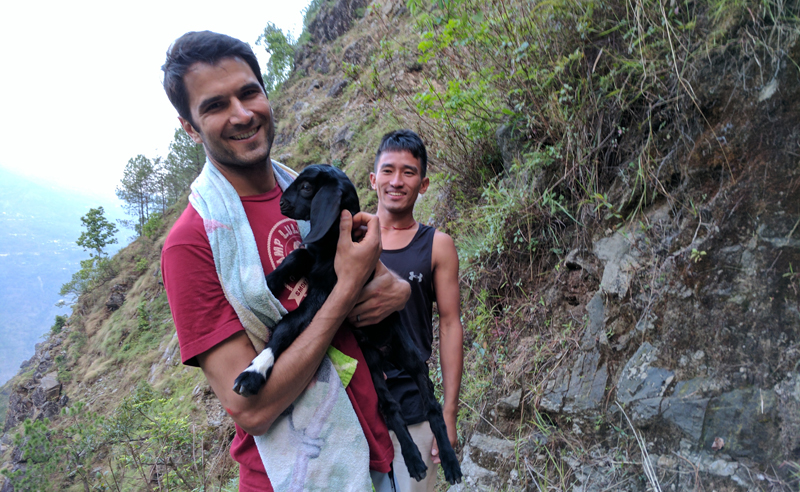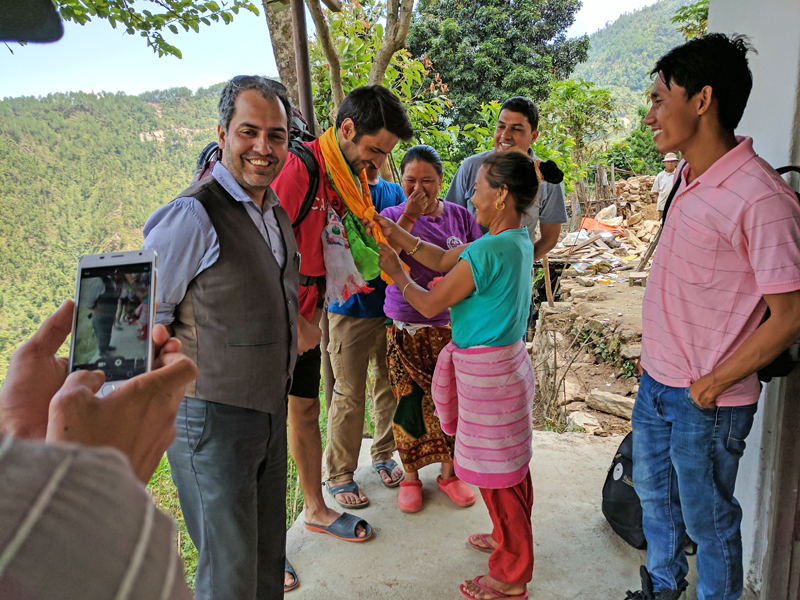You might remember that in 2015, Nepal experienced a devastating earthquake which measured 7.8 on the Richter Scale. It killed nearly 9,000 people, injured nearly 22,000 and left many more people homeless. In the village where I stayed, nearly all permanent structures were flattened by the earthquake. The project I was part of with World Renew aims to rebuild almost 300 family homes in a remote village near the epicentre of the earthquake. My role was general labourer, helping where needed, which typically meant mixing concrete, shaping rebar, and some light masonry work.
The village I stayed in was on the side of a mountain, about 4 hours north west of Kathmandu. The village has been under construction ever since the earthquake and is only part way to a full recovery. The people who live there are, materially, very poor. Living in makeshift shacks, working with old, dated farming techniques, doing degrading work for little pay, and struggling with basic health issues. Yet they still have some of the best things in life: love, relationship, faith, giving, and laughter. In that way they are not so different from us who have, materially, more. We often fall into a trap of measuring our own value and status and that of those around us by our material possessions. Through meeting these people and witnessing their joy amidst their poverty, it was clear how totally out of wack our measuring stick is. It's unjust. These people are struggling through no fault of their own, purely by virtue of where they were born. What did I do to get what I have? Did I put out proportionally more effort to make up for the difference in possessions and opportunity that I enjoy? Absolutely not. I merely followed the very clear path life in Canada has presented me. The Nepali girl in her dirty school uniform walking unaccompanied for miles to and from school is trying just as hard, if not harder, than I ever did. But because she lives in a remote village in Nepal, it's very unlikely she'll have a shot at obtaining the level of material wealth that I have.
This was the first time I witnessed poverty at this scale. I’d always heard about it, but it’s difficult to fully grasp in the abstract. One day, after just a few hours of meeting and then helping a family with their reconstruction, the family invited me into their home and offered me lunch. They currently live in a one room shack constructed of bamboo, sheet metal and twin. It stands just 5ft tall at it's largest and slopes down. It’s only maybe 180 square feet in total, yet houses 3 adults and 4 children. It has a dirt floor and is furnished with a wooden bench used for sleeping, sitting, and eating. This single room also serves as the kitchen, where they have a two burner portable propane stove. One thing it has going for it is the view. They have a breathtaking view of the mountain and the river in the valley below. So there I am, not in want of anything, and they offer to feed me, having not even done much work for them. I couldn't say no, as that would be rude, so I ate their food together with them. We enjoyed each other's company. Lots of laughs about how tall I am, how funny I sound, and the Grandmother who calls me "Canada".
One other quick story.
I was helping an elderly couple one day. I had heard that they were Christians and when I met them, sure enough the man greeted me with the words “Jay muh shee”, which roughly translated means “Praise God”. I had learned that this was a common greeting among Christians. I grew to really like this: it feels like such a wonderful way to start a conversation, with God. Anyway, we were working on the lintel band of the home, a length of rebar that runs the perimeter of block homes set into concrete to give strength to the structure. It had been super hot without a drop of rain the whole time I had been there, and we had been working all day and were getting tired. Finally we finish, and the couple invites me for tea and biscuits to celebrate our accomplishment. Just as we all sit down, nicely protected under the awning of the World Renew field office, the clouds open up and it begins to pour. It was one of those moments where the perfect timing of things can’t help but call to mind God’s sovereignty, and it was at that moment that I was reminded of a verse that my mother-in-law left for me in a letter that I had just read that morning. It was Isaiah 55:10-11:
As the rain and the snow
come down from heaven,
and do not return to it
without watering the earth
and making it bud and flourish,
so that it yields seed for the sower and bread for the eater,
so is my word that goes out from my mouth:
It will not return to me empty,
but will accomplish what I desire
and achieve the purpose for which I sent it.
These people are materially very poor and it’s easy to dwell on that as their whole reality. But God is there, and he has blessed and produced fruits in them which are much more important. Love, faith, giving, laughter and – what stood out to me most in my experience – relationships! We can learn a lot from Nepalese village culture in valuing relationships over productivity and work. I can’t count the number of times our work was interrupted by a visit from a neighbour, or impromptu tea with a passerby. Time is a gift. There will be time for work later. God designed people for relationship.
In conclusion, I can’t say enough good things about World Renew. They took wonderful care of me, and more importantly are doing God’s work throughout our broken world. It was truly amazing to play a small part. It’s my prayer that the people I met in Nepal will successfully finish their reconstruction quickly. I’m so proud that our Church is so supportive of World Renew. Oh, by the way – full disclosure – my wife works for World Renew. But they're still awesome.




